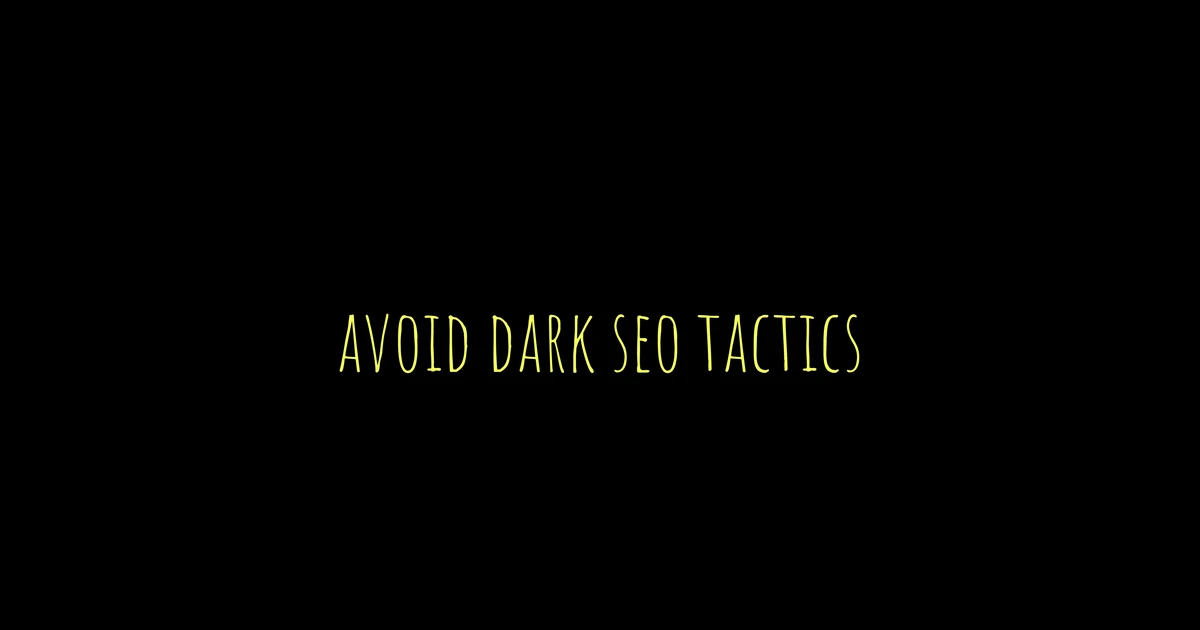Table of Contents
- Buying Links: A Risky Mistake
- Hidden Links and Content: Deceptive Practices
- Keyword Stuffing: A Readability Issue
- Cloaking: Misleading Search Engines
- Private Blog Networks: A Dangerous Game
- Frequently Asked Questions
In the world of SEO, certain dark tactics can lead to serious consequences. Buying links may seem tempting, but it goes against Google’s guidelines and can result in harsh penalties. Similarly, hidden links or content—text made invisible to users—are easily detected and lead to spam classifications. Keyword stuffing might give a short-lived boost but ultimately harms user experience and site credibility. Cloaking is another risky move, showing different content to search engines than what users see, which could get you banned from search results entirely. Lastly, private blog networks are also high-risk strategies that can trigger severe penalties due to their manipulative nature.
1. Buying Links: A Risky Mistake
 Purchasing links is a practice that can severely undermine your website’s credibility. When you buy links, you risk losing the trust of your users, who may view your website as less authentic. Google continuously updates its algorithms to detect these link-buying schemes, and getting caught can lead to serious penalties. Websites that engage in this practice often experience a significant drop in organic traffic, which can be hard to recover from. Additionally, reputable sites avoid buying links to maintain their integrity and reputation in the digital space. Instead of focusing on purchased links, aim to earn them through genuine engagement and high-quality content. Organic links not only provide better long-term value but also foster better relationships with other webmasters and bloggers. The financial investment in buying links frequently yields no return, making it a risky and unwise strategy.
Purchasing links is a practice that can severely undermine your website’s credibility. When you buy links, you risk losing the trust of your users, who may view your website as less authentic. Google continuously updates its algorithms to detect these link-buying schemes, and getting caught can lead to serious penalties. Websites that engage in this practice often experience a significant drop in organic traffic, which can be hard to recover from. Additionally, reputable sites avoid buying links to maintain their integrity and reputation in the digital space. Instead of focusing on purchased links, aim to earn them through genuine engagement and high-quality content. Organic links not only provide better long-term value but also foster better relationships with other webmasters and bloggers. The financial investment in buying links frequently yields no return, making it a risky and unwise strategy.
| SEO Tactic | Risks and Consequences |
|---|---|
| Buying Links | – Against Google’s Webmaster Guidelines. – Can lead to automatic and manual penalties affecting specific pages or entire site. – Google can track purchased links, severely harming rankings. |
2. Hidden Links and Content: Deceptive Practices
Hidden links and content involve making certain elements of a webpage invisible to users while still allowing search engines to see them. This is often done by using CSS to match the color of the text to the background, making it undetectable to the human eye. While some may think this is a clever trick to boost rankings, search engines have advanced algorithms that can identify such manipulative tactics. If detected, websites can face severe penalties, including immediate removal from search indexes.
Moreover, when webmasters engage in hiding content, they expose themselves to manual reviews, which can lead to further consequences. This practice not only fails to provide any real value to users but also diminishes the overall user experience. A site that employs hidden links risks being associated with spammy behavior, severely harming its reputation.
Transparency is crucial in building trust with your audience. Search engines are increasingly prioritizing user experience over deceptive tactics. Instead of resorting to hidden content, website owners should focus on delivering clear, valuable information that genuinely benefits their users.
- Hidden links are often created using CSS to match background colors.
- Search engines can detect hidden content through various algorithms.
- This tactic can lead to immediate removal from search indexes.
- Webmasters may face manual review if hidden content is suspected.
- Hidden content fails to provide value to users, damaging user experience.
- Using hidden links can severely harm a site’s reputation.
- This practice is often associated with spammy websites.
- Transparency in content is crucial for building trust with users.
- Search engines prioritize user experience over manipulative tactics.
- Instead of hiding content, focus on clear, valuable information.
3. Keyword Stuffing: A Readability Issue
 Keyword stuffing is the practice of overloading your content with certain phrases or terms in a way that disrupts the natural flow of reading. This leads to unnatural and awkward phrasing, making it difficult for users to engage with your content. Search engines are designed to detect such patterns and will often penalize sites that employ this tactic. Prioritizing clarity and engagement is essential, as overly optimized pages are unlikely to rank well due to the negative user experience they create. Instead of jamming keywords into your text, strive for a balance where keywords fit naturally within the context. Quality content should always be your primary focus, ensuring that it effectively answers user queries. Using synonyms and related terms can help enhance your content without sacrificing readability. Remember, high user engagement metrics are crucial; keyword stuffing can lead to a decline in these metrics, potentially harming your site’s reputation.
Keyword stuffing is the practice of overloading your content with certain phrases or terms in a way that disrupts the natural flow of reading. This leads to unnatural and awkward phrasing, making it difficult for users to engage with your content. Search engines are designed to detect such patterns and will often penalize sites that employ this tactic. Prioritizing clarity and engagement is essential, as overly optimized pages are unlikely to rank well due to the negative user experience they create. Instead of jamming keywords into your text, strive for a balance where keywords fit naturally within the context. Quality content should always be your primary focus, ensuring that it effectively answers user queries. Using synonyms and related terms can help enhance your content without sacrificing readability. Remember, high user engagement metrics are crucial; keyword stuffing can lead to a decline in these metrics, potentially harming your site’s reputation.
4. Cloaking: Misleading Search Engines
Cloaking is a practice where different content is presented to search engines than what is shown to users. This can occur through user-agent detection, where the server detects whether the request comes from a search engine or a regular user, and serves differing content accordingly. Search engines, however, are equipped with sophisticated algorithms that can easily identify cloaking. Engaging in this deceptive tactic not only violates search engine guidelines but can also lead to severe penalties, including deindexing, which means removal of your site from search results altogether.
The implications of cloaking extend beyond penalties; it misleads users and erodes their trust in your content. When users click on a link expecting to see certain information and are met with something entirely different, it creates a negative experience. This tactic may seem like a shortcut to manipulate rankings, but search engines prioritize relevant and authentic content that aligns with user intent. Instead of risking your website’s reputation with cloaking, focus on delivering transparent, high-quality content that meets the needs of your audience. By ensuring that the content presented matches what users expect, you build credibility and foster long-term SEO success.
5. Private Blog Networks: A Dangerous Game
Private Blog Networks (PBNs) are a collection of websites created primarily to manipulate search engine rankings by providing backlinks to a main site. This tactic might seem appealing for quickly boosting visibility, but it is inherently risky. Search engines have become increasingly sophisticated in detecting PBNs, and involvement in such networks can lead to severe penalties, including significant drops in rankings or even removal from search results altogether.
Investing in a PBN can require substantial resources, with no guarantee of success. The unstable nature of PBNs means that they do not establish a solid foundation for long-term SEO efforts. Instead of relying on these networks, focusing on acquiring quality backlinks from diverse and reputable sources can yield better results. Building genuine relationships with bloggers and creators in your niche allows for organic link-building, which is far more sustainable and effective.
Moreover, PBNs can create a false sense of security. While your rankings may improve temporarily, they do not reflect genuine authority or trustworthiness. Engaging in PBNs often distracts from legitimate SEO strategies, which prioritize valuable content and real engagement with your audience.
Frequently Asked Questions
1. What are dark SEO tactics, and why should I avoid them?
Dark SEO tactics are unethical methods used to improve a website’s ranking in search engines. These tactics can lead to penalties or bans from search engines, harming your site’s reputation.
2. How can using black hat SEO techniques affect my website’s long-term success?
Using black hat SEO techniques might lead to quick gains in traffic, but they can cause severe long-term damage, such as drops in rankings or complete removal from search results.
3. What is keyword stuffing, and why is it considered a dark SEO tactic?
Keyword stuffing is the practice of overloading a webpage with keywords to manipulate search rankings. This tactic can result in a poor user experience and penalties from search engines.
4. How do I recognize and avoid link schemes?
Link schemes involve manipulating links to boost SEO, like buying links or excessive link exchanges. To avoid these, focus on earning links naturally through quality content and relationships.
5. Why is it important to have ethical SEO practices instead of resorting to dark tactics?
Ethical SEO practices help build trust and credibility with both users and search engines. They lead to sustainable, long-term growth as opposed to the risky, short-lived benefits of dark tactics.
TL;DR Avoid dark SEO tactics like buying links, hidden links or content, keyword stuffing, cloaking, and private blog networks. These practices violate search engine guidelines and can lead to penalties or harm your website’s reputation. Focus on ethical SEO methods that prioritize user experience and comply with search engines.


